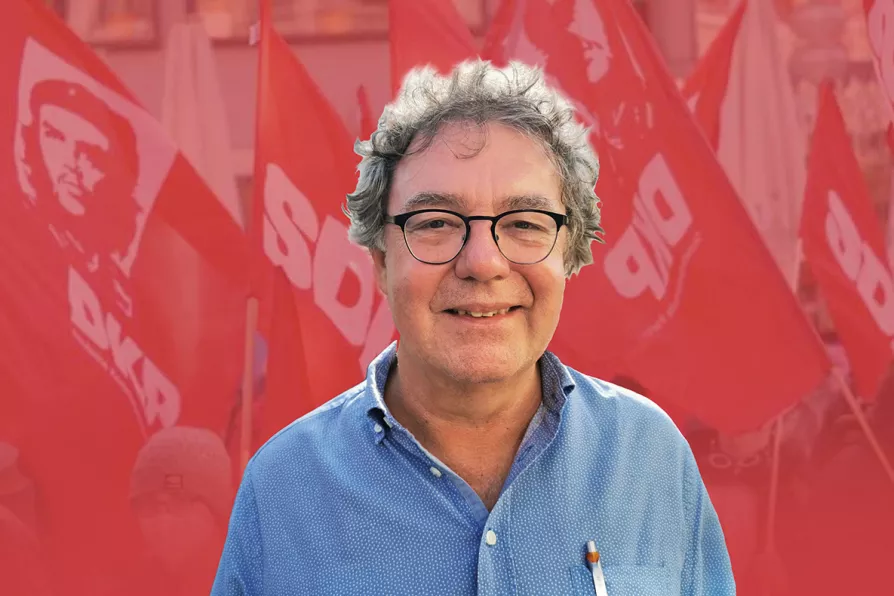From London’s holly-sellers to Engels’s flaming Christmas centrepiece, the plum pudding was more than festive fare in Victorian Britain, says KEITH FLETT

 German Communist leader Patrik Kobele
German Communist leader Patrik Kobele
GERMAN Communist leader Patrik Kobele is in no doubt of the scale of the economic crisis facing his country: “Millions of people will become poor. Including millions who do not expect this.
“I mean there are millions of working poor who do expect further impoverishment because this is what they experience in every crisis. But — I think you face similar in Britain — we are now talking about people with professional jobs, with mortgages, people who have thought of themselves as comfortably off who are looking at rising bills and realising, ‘We will not be able to pay this’.”
The price of energy in Germany is not rising quite as fast as in Britain — but the government’s decision to impose an energy levy of 2.4 cents per kilowatt hour on households to prop up energy firms — some of which are actually profiting significantly from rising prices — looks like an even blunter prioritisation of private-sector profitability over people’s welfare, likely to cost families hundreds of euros extra a year.
There have been calls from Die Linke (the Left Party) for weekly protests against the levy — though elements of the party have poured cold water on the idea, with Thuringia’s Minister-President Bodo Ramelow suggesting that a street protest movement would attract far-right involvement. (This prompted an immediate row with colleagues like co-chair Martin Schirdewan who saw this — probably rightly — as an attempt to keep discontent within the framework of “official” politics).
Kobele knows where he stands on that: “I hope the levy will provoke a huge protest movement.
“We need this social movement. The ruling-class strategy right now is to transfer the pain of the economic crisis created by their own policies — particularly the sanctions on Russia — onto working-class people.
“Everyone on the left should be looking at how to organise protests in their communities and to link social protests with peace protests, because the economic suffering is tied to the war.”
But unfortunately, he sees big obstacles in the way of such a movement currently — particularly that there is no enthusiasm from the trade unions.
“At the moment union leaderships are basically endorsing the course of the government.
“They are not orienting for struggle, unlike the unions in Britain. They are seeking to find solutions together with monopoly capital and the government. The problem is that in a crisis of this scale there will not be any such solutions.”
Die Linke MP Sevim Dagdelen had told me she felt the current “traffic light” coalition — of the Social Democrats (SPD), Greens and Free Democrats — was the worst German government in postwar history. Was she right that a Social Democrat-led coalition was worse than the Christian Democrat (CDU) one of Angela Merkel?
“Yes, it is genuinely much more aggressive. Not just on international policy but domestically too — it is preparing to implement a policy that will hurt working-class people far more than Merkel did.”
Only because the economic crisis has reached a crescendo this year?
“Not just because of timing. The reality is that the CDU could not implement a policy like this, because if you are going to force down real wages you need the unions. And to get unions to agree to their members getting poorer, you need the SPD.”
And the other members of the coalition? “The Free Democrats have always been a neoliberal party and the Greens have become a neoliberal party, as well as the most aggressive on foreign policy.”
One puzzle is that German monopoly capital seems united behind an economic strategy of disengaging from Russia, when its role as Europe’s manufacturing powerhouse is unusually dependent on Russian raw materials, especially energy.
“There are undoubtedly different fractions in capital and the war has increased the influence of the most aggressive fraction. You know the phrase from Marx about the executive being a committee for managing the affairs of the whole bourgeoisie.
“Evidently they have decided that they need to be integrated completely into the Nato course. It will cause problems, big problems. You saw last month the state forced to bail out the energy giant Uniper with billions of euros.
“But the plan seems to be to resolve those problems by passing the pain on to the working class.”
Kobele isn’t sure how long this will last, noting German monopoly capital has traditionally regarded US capital as a rival. But for the time being complete adherence to the US position on the Ukraine war — no negotiated peace, arms to Kiev, decoupling from the Russian economy whatever the economic cost — is the official consensus right across German “official” politics and the line being taken in public by big business and union leaders too.
Could it change?
“Sure. Another EU crisis is coming, we cannot say how deep, but the economic damage in Italy and Spain will be severe too.
“Germany’s leaders are playing with fire. And any strike movement in any country can make workers stand up and ask, ‘Why aren’t we doing that?’
“That applies now to Britain, where there is movement.”
Patrik Kobele is general secretary of the German Communist Party (DKP).

In part two of May’s Berlin Bulletin, VICTOR GROSSMAN, having assessed the policies of the new government, looks at how the opposition is faring













